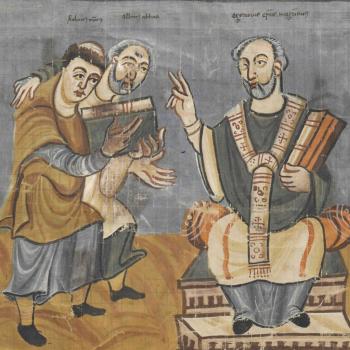I have been engaged in a debate of sorts with Bill Hamblin on the historicity of the Book of Mormon, over at his blog, Enigmatic Mirror. (For the uninitiated, he is a prominent figure in “Ancient Book of Mormon Studies”). He is a trooper about posting my stuff on his site, which I appreciate.
Meanwhile, this posting of mine builds on recent debates. I think this present response is important because it gets to the heart of all the discussions we have been having here recently, and to any and all of my requests for concrete, specific evidence. I don’t for a second think his latest comments answer these problems, nor do they even address them directly. I was amused to see how far he is trying to divert the debate from any topic at all that might touch on any embarrassing discussions of the Book of Mormon!
The whole historicity issue necessarily involves issues of methodology. Throughout, Hamblin has grounded himself in what I regard as bizarre assertions that history and archaeology are not empirical disciplines. Following from that, he denies the concept of objective evidence, a phrase he usually (and scornfully) puts in quotes. He does not believe we can speak of objective evidence of the past: we cannot seek it, will not find it, and it is futile to attempt to do so. Although his approach is clearly and heavily post-modern in tone, he rejects that label. Fair enough on that last point, if that is what he thinks, but in that case, where is he coming from?
Reading one latest post, I may have the answer. As I read it, either he does not know the conventional meaning of the word empirical, or else he is using it in an arbitrary and idiosyncratic way that has no relationship to common usage. His view is this: as you cannot experiment on the past, or observe it directly at first hand, therefore neither history or archaeology can be empirical. QED, right? And by the same token, he says, there is no such thing as objective evidence of the past.
But don’t follow what I say on the subject, check it out for yourself. Please read what Hamblin wrote in that post, then look up any number of dictionary definitions of empirical and see if you can find one that meets his usage. In reality – in all standard usage – empirical means primarily using observation, which need not be of the actual first hand events. The word actually comes from a Greek original meaning “From Experience,” ie as opposed to just theorizing. Observation does not necessarily involve experiment, and in most cases, it does not.
In my view, his post indicates a fundamental misunderstanding of historical and archaeological methodologies. No wonder he is getting stuff wrong.
Let me elaborate.
Dr. Hamblin is obviously and undeniably correct in saying that the past does not presently exist. He is also right to say that “our only capacity to interact with the past is inherently indirect. We interact with the Past by studying the evidence left by past people–texts, inscriptions, art, artifacts, monuments, tools, tombs, etc. We can understand the past only by studying those things, which were made or done in the Past, but which still exist in the present.” No less obviously, “data from the Past needs to be interpreted precisely because the Past no longer exists.” Amen and amen. I couldn’t have put it better myself.
It is flagrantly wrong, though, for him to conclude that “Hence, the study of history is not empirical–that is, we cannot directly observe with our senses or experiment on the Past. History is a non-empirical discipline.” This is false, and a non-sequitur. From his subsequent remarks in his earlier post, about “This is not objective,” I understand him to take the same wildly incorrect approach to archaeology.
By the way, I think his most recent material about “observing the present in the past” versus observing the past is casuistical hair splitting in the extreme, and would make sense to virtually no historians or archaeologists. Where on earth does he get this stuff from?
Let me define my terms. I am taking these definitions from general dictionaries, and they seem adequate for the purposes of discussion:
“Objective evidence is data that shows or proves that something exists or is true. Objective evidence can be collected by performing observations, measurements, tests, or using other suitable methods.”
Alternatively, objective evidence is “Information based on facts that can be proved through analysis, measurement, observation, and other such means of research.”
“Empirical evidence is information acquired by observation or experimentation. This data is recorded and analyzed by scientists and is a central process as part of the scientific method.”
Empirical means “based on, concerned with, or verifiable by observation or experience rather than theory or pure logic.”
Will he accept those?
True, the past does not currently exist. As he rightly says, though, it has left traces that do – in the form of archaeological remains, documents, inscriptions, pottery, buildings, metalwork, whatever – and those traces, those data, can be subjected to empirical research. They can be observed, collected and analyzed, commonly through quantitative techniques. Any such research is empirical, and that is what archaeologists do every day. Look at any archaeological article in any mainstream journal, and this is what you see. Accompanying that process of observation and data collection are such standard scientific techniques as the formation and testing of hypotheses.
I suppose history need not be empirical in each and every instance, but most of it assuredly is. Any historical study that involves quantification of any kind is of necessity empirical. It means collecting and presenting data in a way that they can be tested and replicated by other scholars. That is empirical study. Other forms of history, using qualitative data, are also empirical.
This is not a matter of opinion, of “Well, Jenkins has his view and his definitions, and I have mine.” I can cite any reputable dictionary or science textbook for these definitions, he can cite none to support his view. Please show me some other scholar asserting that History is a non-empirical discipline?
If you want to see such verification and testing at work in the discipline of History strictly defined, then observe the national scandal involving Michael Bellesisles, who made far-reaching claims about the possession and use of firearms in early American history. His claims, which were heavily quantitative and (apparently) empirical in nature, were examined and debunked by other scholars, and his whole argument was shown to be false. Bellesisles presented what he claimed to be objective evidence, and other scholars showed that it wasn’t. The scientific process worked beautifully.
Obviously, most examples of testing and falsification are nothing like as thoroughgoing and traumatic, and subsequent researchers merely modify and adapt the claims in light of further research. But testing is indeed what they do.
I assume Dr. Hamblin is not arguing that because data need interpretation, therefore they cannot be objective? But equally, when I observe something at first hand, I must necessarily be exercising my interpretive skills to see and understand what is going on around me. Or perhaps he is saying that nothing whatever is objective, whether we see it first hand or not? If so, then we are indeed wandering into the deepest swamps of post-Modernism.
Let me give another example, which does not bear directly on the Book of Mormon. It is by Tim Beach, with several co-authors, and it is entitled “Ancient Maya impacts on the Earth’s surface: An Early Anthropocene analog?” Quaternary Science Reviews 124 (2015): 1-30. I note that one of the co-authors, Richard Terry, is BYU faculty. If Hamblin cannot access the article, I will be happy to send a copy.
This fine article describes how the Maya transformed the landscapes in which they lived, with a major focus on the Classic Maya. “Highlights” of the findings include the following: “The Ancient Maya left a richly variegated landscape of the Early Anthropocene. … Ancient erosion truncated soils and buried sinks, leaving golden spikes in strata …. They left positive impacts or landesque capital such in terraces and wetland fields. … They lived through pluvials and droughts, perhaps exacerbating Late Classic drought. …. They left myriad adaptive features such as reservoirs and useful species still extant.”
I am not qualified to assess the detailed methodologies used here, but the article seems to me thoroughly convincing, indeed revelatory, and it is a significant contribution to the archaeological literature. It also has enormous implications for future historians studying the ancient Maya. The scholars observe the surviving traces of the past in order to reconstruct that past, and they do so richly. They are telling us about how people lived and worked, how they organized themselves, and how they reshaped their world. What could be more fundamental historical questions?
This study is one of a couple of thousand I could offer to show modern scholars using objective evidence, and clearly empirical evidence, to be assessed through empirical techniques in order to form a picture of the past – in this case, the past of more than a millennium ago.
With that in mind, let us return to Hamblin’s statement:
“Hence, the study of history is not empirical–that is, we cannot directly observe with our senses or experiment on the Past. History is a non-empirical discipline.”
So, does he think the “Ancient Maya impacts on the Earth’s surface” article is empirical or not? If not, why not? Or does he believe the authors constructed a time machine to go and observe the ancient Maya directly at first hand, in 1000AD? Research via TARDIS?
Is he confusing archaeology with ethnography?
To the contrary, then, history and archaeology are indeed empirical disciplines, and can be used to test claims about the past, such as those implied by the Book of Mormon. Claims can and must be made, and then tested.
If it is scholarship, it is neither subjective nor impressionistic. If it is subjective and impressionistic, it is not scholarship. And at no point does a volume of subjective and impressionistic ideas, no matter how abundant, suddenly transmute to become objective fact. The plural of anecdote is not data.
And as I have urged in the past, I am still waiting for Dr. Hamblin to produce the slightest single piece of plausible or credible evidence – yes, that’s objective evidence – to confirm any single story, fact or statement about the New World found in the Book of Mormon. As yet, he has offered nothing that comes close to qualifying.
As to his question about New Testament study, some of that scholarship is empirical, some not. That is in no sense an analogy to the Book of Mormon stuff, where the whole goal has to be to establish, via empirical history and archaeology, whether any of those peoples or societies ever existed. Nobody but nobody doubts that the Jewish world existed in roughly the form described in the New Testament, nor that the Roman Empire existed much as it did. Nobody is publishing breathless articles finally proving that cities like Antioch and Capernaum actually existed, and suggesting that we might someday be able to reconstruct their locations! Or that we might find the names of New Testament figures actually confirmed in external sources! Um, we know all that.
In that context, we are absolutely agreed on the foundations of history. Hence, this is not an analogy worth pursuing. He is raising it only for purposes of obfuscation.
Just on a side-note, Dr. Hamblin has a disciple named Neal Rappleye, who wrote supporting his position. Neal likewise rejected my “objective evidence” argument, but he did so by confusing my stance with the issue of objectivity in research, an utterly different matter. Of course we have to be aware of subjective feelings and ideological prejudices in any kind of research, and that concern is the basis of the school known as post-processual archaeology. But that is totally distinct from the question of whether objective evidence exists as a basis for examination and empirical research. That’s pretty fundamental.
It’s hard to debate any issue when the other side is so confused about basic definitions and terms. Should I really have to explain such critical issues?
But it does raise an interesting thought. If the apologists are so fundamentally in error about core issues of methodology, does that explain why they get into such total absurdities?
JUST AS AN UPDATE.
Bill Hamblin has a new post at
http://www.patheos.com/blogs/enigmaticmirror/2015/07/17/hamblin-33-moving-the-goal-posts/
in which he accuses me of not accepting the “evidence” he has offered for the Book of Mormon. Here is my reply:
Oh my. I actually asked for credible and plausible evidence, which did not begin to apply (for instance) to your offerings concerning the alleged entrada of the 370s, the supposed king-name Akish, the homonyms, etc. In each case, I pointed out why your explanations were silly and or groundless, and that you should be embarrassed to proffer such weak evidence.
And let’s look at those shall we?
*You WITHDREW Akish yourself when you were told that the name could not have sounded like that – yet here it is?
You write,
I asked if a BOM king name appeared in Maya texts would you accept it as “objective evidence.” You said you would. I provided the evidence. You immediately changed the rules and demanded a different type king name. The fact that the name, date, and royal function of Akish in the BOM matches the name, date and function of U-Kix in the Maya tradition means nothing–mere coincidence.
Then in the SAME POST you write this,
NOTE: My friend Mark Wright, a professional Maya scholar and linguist, just informed me that recent phonetic interpretations of the glyph traditionally rendered as “kix/kish” below are now thought to read “kokan.” If the new interpretation is correct, then this argument is rendered moot.
ie, it can’t be Akish in the first place. Consistency, anyone? Or mere professorial absent-mindedness?
Even if Mr. Akish had been there, I also explained at length why there is no conceivable way it could be the same one as in the Mayan lists. What on earth are you talking about? Did you even read my thorough demolition of your claim?
*And you freely admitted that your homonyms were all so speculative. – yet here it is? By the way, “Random Choice Homophyny” would be a great name for a progressive rock band.
*I have already trashed the Nahom claim beyond repair. Read my NAHOM FOLLIES piece again, if you like. I’m also writing something new at greater length on this.
In each case, therefore, he presented evidence, which I shot down, needing little time or effort to show why the suggestions were ludicrously weak. That is, I analyzed his evidence, and showed why it was utterly wanting. Yet somehow, he presents this as me cynically “moving goalposts.” That’s an interesting rhetorical technique….
Just to show how thoroughly and specifically I have answered Dr. Hamblin’s alleged evidence on each point, please check out some or all of the following:
http://www.personal.psu.edu/faculty/j/p/jpj1/akish.htm
http://www.patheos.com/blogs/enigmaticmirror/2015/07/17/jenkins-20-its-all-coincidence/
and pretty much anything else from our “debate”. Is that “moving goalposts”? Or rather just picking up garbage littering the field?
So that Rule of One thing is still applying. Good luck.
Oh yes, and he also asks this:
Do you, to be consistent, reject the historicity of Abraham, since he is first mentioned in surviving texts in the Bible a good thousand years after he lived, and there is no contemporary evidence of his existence? Do you think your colleagues at Baylor are cranky pseudo-scholars if they accept the historicity of Abraham?
The question speaks volumes for your approach. Nothing in the story of Abraham as we have it in Genesis is impossible or implausible, according to what we know of the time and place. Abraham follows a style of life that is very well known from documents and archaeological remains from that period. He comes from a known city, travels to a known kingdom, and mixes with known peoples and tribes in known places and cities. By “known” I mean confirmed from contemporary documentary and archaeological sources. Whether he did exist is another issue, on which scholars will disagree. If they do make that case, they are certainly not cranky pseudo-scholars.
Now compare any of the Book of Mormon characters: Nothing in their story is possible or plausible, according to what we know of the time and place. They follow a style of life that is utterly unknown from New World documents and archaeological remains from that period, and in many crucial respects, contrasts sharply with what we do know. On no occasion do they come from a known city, travel to a known kingdom, or mix with known peoples and tribes in known places and cities. By “known” I mean confirmed from contemporary documentary and archaeological sources. Therefore, people who claim that those peoples did exist are, indeed, to use your phrase, cranky pseudo-scholars.
Let’s be absolutely consistent in applying the same criteria of evidence in both cases, as you rightly insist. And the lesson we learn about the relative historical value of the Bible and the Book of Mormon is that they are, to coin a phrase, apples and oranges.
And while it is not for me to teach you your job, if I was a Book of Mormon apologist, I would be very cautious indeed about even invoking the name of Abraham, because it raises so many intriguing questions about the Book of Abraham, and what that actually suggests about Joseph Smith’s highly – shall we say – individual techniques of translating ancient documents.
















